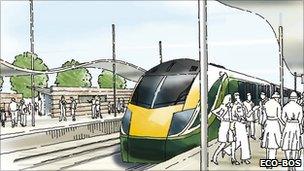Marchers oppose plans for St Austell eco-town
- Published

Cornwall Council says the Eco-Bos project will include improved transport for the area
People opposed to plans for a so called "eco-town" in Cornwall held a demonstration on Saturday.
St Austell is one of four towns in the UK identified by the previous government to share £60m of funding to help launch sustainable communities.
The proposals include redeveloping former Imerys china clay sites in the area to provide homes, leisure facilities and green space.
But opponents fear too few of the 5,000 planned homes will be affordable.
Andrew Deane from the "No Ecotown" group has been campaigning against the planned community.
He told BBC News: "Everyone's heard of the eco-towns, but nobody really understands what it is.
"When we explain to people the amount of homes and where they're going to be - in an area of outstanding natural beauty - about 90% of the people we speak to are absolutely flabbergasted."
But Cornwall Council said the project was expected to create up to 5,000 new jobs, improve the transport infrastructure and encourage inward investment for a more prosperous and sustainable future for the area.
Developer Eco-Bos said its plan was to create one of the most sustainable integrated town developments in Europe in Mid-Cornwall, with 40% of the 5,000 homes affordable.
Former Truro and St Austell MP Matthew Taylor has been appointed independent chair of a board set up to develop the "Clay Country" project.
The other three areas in the UK chosen to develop eco-towns are Rackheath in Norfolk, Bicester in Oxfordshire and Whitehill Bordon, East Hants.